#Vocational Rehabilitation For Mental Health
Text
Recovery Hub India offers employment support & access to skills development to young people who are suffering from mental health issues. Contact us today!
#Vocational Rehabilitation For Mental Health#vocational rehabilitation in india#Rehabilitation center near me#Social Rehabilitation services#vocational rehabilitation in mental health#occupational assessment services#vocational rehabilitation center
1 note
·
View note
Text
I've been trying for years to get help. I fought the SSA and lost. The legal people I hired to help me in the fight failed me. Psychiatry wasn't helpful because I have a metabolic problem that makes many medicines ineffective. I wasted a decade talking to psychologists and LCSWs. I've reached out to autism advocacy groups, and every single representative from all of those groups ghosted me. I've even contacted the National Suicide Prevention Hotline, and the counselor I spoke to read from a script, didn't address my specific concerns, and ended our conversation telling me she had to go. Working with vocational rehab and job services hasn't been productive either. I feel like I am falling through the cracks. I can't understand what's happening. It seems impossible that so many different people and agencies would fail. I'm miserable, I'm despairing, and I don't know what to do.
#vocational rehabilitation#job services#disability#suicide prevention#autism#mental health#depression#PTSD
0 notes
Text
Officially Done.
Last assignment turned in ✔️
900 + hours of Internship I & II ✔️
Masters degree in Mental Health and Clinical Rehabilitation ✔️

#clinical mental health#vocational Rehabilitation#vocational Rehabilitation counselor#masters degree
1 note
·
View note
Text

@pisforpandemonium Absolutely!
So the first book I'm gonna recommend is Soteria by Loren Mosher and Voyce Hendrix. It's about the development of a home/intentional community for people with schizophrenia/psychosis. This home was very pro-autonomy, many workers had psychosis themselves, and they did use meds, but it was always the resident's choice and usually not the first line of treatment, as they found that psychosis often resolved on its own within a few weeks. Some of the methods used at Soteria were a little... wacky, being the 70s, but all in all it was very successful. There are now Soteria Houses all over the world.
Another one is Healing: Our Path From Mental Illness to Mental Health by Thomas Insel, MD. It's written by the former director of NIMH, and while I don't agree with every one of his takes, there is a great chapter about the Clubhouse Model, another peer support model created by a bunch of ex patients, by and for people with mental illness. People in the clubhouse are Members, not patients. They are assisted with vocational goals, food, etc, and most importantly, given community. It's a really interesting paradigm and there are hundreds of clubhouses all over the world now.
The Voices Within by Charles Fernyhough is a bit dry IMO, but it goes over the research behind voice-hearing and goes into the Hearing Voices Movement - another, you guessed it, peer support movement for voice hearers and other folks who have experiences not aligned with consensus reality i.e. psychosis.
Some others I haven't read yet are Geel Revisited after Centuries of Rehabilitation by Eugeen Roosens, and On Our Own: Patient Controlled Alternatives to the Mental Health System by Judi Chamberlin.
I'm also gonna rec a bunch of podcasts.
Heart Forward: Conversations from the Heart has a ton of awesome episodes about the US mental health system and alternatives to it. They have lovely episodes about peer respite and Trieste. It's such a compassionate and solution-focused podcast with a diverse amount of topics, I love it.
Patricia Deegan: Personal Medicine is a great one about Dr. Deegan's life and the Commonground Software she developed to help aid in joint decision-making with patients and providers, where patients have a solid say in their treatment. (I've listened to a ton of interviews with Dr. Deegan and she is an amazing, inspiring individual)
A Place of Safety? is hosted by an Italian psychiatrist who worked in Trieste (an Italian city with world-renowned mental healthcare) and he talks about a lot of problems with the NHS and how it relates to Trieste.
Alita Taylor - Open Dialogue is an episode about a highly successful mode of treatment in Western Lapland for people with psychosis and other mental illness. Here's a documentary I just found about the practice, haven't watched it yet but it looks cool.
Mad in America also has some interesting podcasts about many of these topics
Some articles:
Bethel House, basically Japan's version of Soteria
Hearing Voices Movement, as previously discussed
Hurdalsjøen Recovery Center, a "medication-free" hospital in Norway (meds are optional, not banned lol, and they also assist with tapering off)
Recovery Colleges, where struggling individuals, caregivers, and professionals all take an active role in learning about mental health
Obvs this isn't everything but I hope I've given you a good starting point!
#it's actually a goal of mine to write a book summarizing every one of these that I'm aware of lol bc afaik there isn't one yet#just every goddamn innovative and humane mental health practice there is :3#pisforpandemonium#reply#psychiatry#mental health#psychiatry critical#healthcare reform
155 notes
·
View notes
Text
In the spirit of Samhain, I'd like to wax poetic about U.S. government systems that actually help
For those of you who don't know, the nonreligious holiday of Halloween evolved from the Pagan holiday of Samhain (pronounced sow-wen) overlapped with the Christian holiday All Saints Day Eve (saints=hallows, so Hallows Eve became Halloween). All Saints Day Eve is nothing to write home about, but Samhain is where most of our Halloween traditions come from. Notably, the tradition of candy-giving stemmed from the tradition of feeding needy children in exchange for prayers for the souls of your dead loved ones. I do not have any dead loved ones I need you to pray for, but I wanted to keep the spirit of helping each other on Samhain alive by sharing the one resource that I have, which is knowledge.
Medicaid. I love medicaid. It varies greatly from state to state but in Pennsylvania it's awesome. My mental health visits, medications, specialists, urgent care, vaccinations, pretty much everything I need except dental. From what I understand it can be difficult to get but it's well worth it. It's pretty much the closest thing you can get to free healthcare in the U.S.
Supplemental Nutrition Assistance Program (SNAP). You might have also heard this program called "food stamps" or EBT. Basically, you receive a grocery gift card with a set amount on it that you can use at any store that takes it. The amount you get depends on your income level and the number of household members. I'm frankly unfamiliar with the process of getting on SNAP but we were on it for much of my childhood and we definitely would have struggled to get enough to eat without it.
Office of Vocational Rehabilitation (OVR). This one is for my disabled friends. My particular OVR agent has been difficult to work with but the services they offer are excellent. They can help you get accommodations, mobility aids, and other assistance with work. If you're trying to work with the government's absolute worst program, the Social Security Administration, to get on SSI or SSDI a declaration from OVR that they can't find work for you can also help your case.
211. 211 is a government-run hotline that hooks you up with programs in your local area that might be able to fill a need for you like housing, legal services, food, etc. You can call, text you zip code to 898211, or go to the 211 website for your state. This one is very new to me but so far it helped me find my county's housing authority and get on a waitlist for section 8 so I'm liking it already.
8 notes
·
View notes
Text
"Comprehensive Psychiatric Services in the Heart of Maryland"
Healthy Mind Maryland offers psychiatric day programs for adults living with serious mental illness. Our programs deliver individualised services and resources to promote recovery and help clients become more independent.

Psychiatric rehabilitation encompasses a range of programs. They share the goal of helping people with serious mental illness successfully manage the symptoms of their illness and develop independent living skills.
Our psychiatric rehabilitation program in Maryland promotes independent living skills through intensive daily support. Programs are conveniently located in counties throughout the state of Maryland. In the evenings, clients return home. At home, they get hands-on practice using the skills they learn during the day.
KEY COMPONENTS OF PSYCHIATRIC REHABILITATION PROGRAMS IN MARYLAND
PERSONALISED TREATMENT PLANS
Psychiatric services in Maryland prioritize individualized treatment plans, recognizing that each person's journey to recovery is unique. These plans often encompass a combination of therapy, medication management, and skill-building exercises tailored to the specific needs and goals of the individual.
COMMUNITY INTEGRATION
The programs emphasize the significance of community integration, acknowledging that a supportive social environment is crucial for sustained recovery. Activities that foster community involvement, vocational training, and social skill development play a pivotal role in helping individuals regain a sense of belonging and purpose.
EMPOWERMENT THROUGH EDUCATION
Knowledge is a powerful tool in the journey towards mental health recovery. Psychiatric services in Maryland prioritize education, providing individuals with the necessary information and skills to better understand and manage their mental health conditions. This empowerment creates a foundation for informed decision-making and self-advocacy.
VOCATIONAL REHABILITATION
Recognising the importance of work in promoting a sense of purpose and stability, psychiatric rehabilitation programs in Maryland often include vocational training and support. This component assists individuals in building or re-establishing their careers, fostering economic independence and self-esteem.
HOLISTIC WELLNES
Maryland's psychiatric services go beyond symptom management, emphasizing the holistic well-being of individuals. Physical health, nutrition, and mindfulness practices are integrated into the rehabilitation programs to address the interconnected nature of mental and physical health.
SUCCESS STORIES:
The success stories emerging from Maryland's Psychiatric Rehabilitation services Programs paint a picture of resilience, hope, and transformation. Individuals who have participated in these programs often report significant improvements in their mental health, increased self-confidence, and a renewed sense of purpose.
CONCLUSION:
Healthy mind psychiatric rehabilitation services Maryland's commitment is to advancing showcases a progressive approach to mental health care. By prioritizing individualized treatment, community integration, education, vocational support, and holistic wellness, these programs are paving the way for a brighter and more hopeful future for those navigating the challenges of mental health conditions. As awareness grows and stigma diminishes, the transformative power of psychiatric rehabilitation services in Maryland continues to shine, offering a path towards recovery, resilience, and lasting well-being.
2 notes
·
View notes
Text


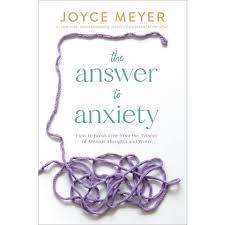
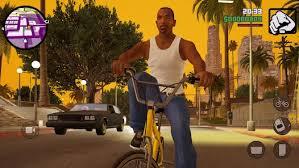


Again Happy New Year 🎊 to everyone all across the world and their family ❤️ thank you
Today
Proposing the letter of explanation concerning employment and housing for the formerly incarcerated act , this law is to be tact onto the fair chance act to compete for employment act passed by Me Allen Henry and former mayor Bill De Blasio of the year 2019 ,
🎆Happy new year my concern is to further expound on the subject of fair chances for all citizens of America and assimilate and integrating the formerly incarcerated into housing and employment to therefore stop the recidivism ratio of people returning to prison instead of them being a given a fair chance to obtain housing and employment in any occupation or types of buildings to live in without any discrimination . What I propose is that an letter of explanation being taken into full consideration to grant that candidate their housing and employment without any barriers to entry into their career of their choosing and their housing choice . It should be illegal to turn down a person with a proven track record of having served their debt to society through programs of rehabilitation with a list consisting of the forms of rehabilitation as proof to that person studying and learning to be fit , safe to be around , civilized and ready to go back to a normal life or for those curse by generational poverty and underdevelopment of character that made those wrong choices by not being educated at the moment about their choices and what it may cause in their life by not being conscious or fully made aware of what their actions may cause on the future chances in employment and residential areas choice of living , if we don't really take their letters of explanation in and their proof of rehabilitation then we are creating condemned career criminals or permanent situation where that person can only achieve so much and not what this country and its democracy promises that person .
A letter of explanation should consist of :
Programs that deal with issues of
GED or high school diplomas for adults and contuining adult education program
Hard skills technology course skills needed to do the job and that's occupations technical skills
Vocational rehabilitation Access Vocational rehabilitation programs process and certificate
Anger management groups and sessions
Drug abuse
Cognitive distortions , cognitive behavior therapy a program that changes their perspective on current actions , behaviors and thoughts that led their in that situation CBT has proven to help create that change and for people that went through that process a much much better life
All mental health issues then the dual disorder effects
And all other irrational thinking erroneous way of behaving and cognitive distortions that person has to be given a chance to express that change and be granted employment and their housing so that people can get it together give them that chance and fully appreciate and take in the letter of explanation for heavy consideration for employment , loans , mortgages and then their housing in residential buildings without discrimination as if no proof of rehabilitation has been given through process and certification .
Please consider them without any discrimination .
" To the promise land the book helps us to remember King 👑 as a prophet for poor and working class people , as we carry on that campaign against racism and poverty in our own times . A terrific book , - Timothy B . Tyson
Author of the blood of Emmit Till
Northern Ghettoes are the prisons of men
I have the audacity to believe that peoples everywhere can have three meals a day for their bodies , education for their minds , and dignity , equality , and freedom for their spirits .
King Nobel Peace prize speech 👑
Oslo , Norway , December 10 , 1964
Labor and civil rights at the crossroads , 1964 - 1966 .
There are three major social evils that are alive in our world today .... The evil of war , the evil of economic injustice , and the evil of racial injustice .
Let us continue to hope , work , and pray that in the future we will love to see a warless world , a better distribution of wealth , and a brotherhood that transcends race or color . This is the gospel that I will preach to the world .
Let us develop a kind of dangerous unselfishness ... I may not get there with you . But I want you to know that we as a people will get to the promised land !
King in Memphis , April 3 , 1968
Happy New York to everybody from every communities across the world I wish you and your family a Happy New years and enjoy your parties and yes I will be right by your side in spirits partying with you so you don't miss me I'm there with you , remember to get a designated driver if you get too Intoxicated to drive after your party 🎉 remember lotta of accidents occur because of someone was irresponsible and try to get behind the wheel too drunk to drive so get a driver buckle up and watch for innocent pedestrians crossing the streets please be careful people kids are out there so drive slowly and cautiously please and enjoy your party and holiday and light a blunt for me laughter that's hot , thank you and happy holidays everybody I'm there with you at the party so let's party 🎉 thank you you won't miss me I'm there with you .
Shout out to Nas the rapper he taught me to just be about business the business my own business and enjoy people get along and life is very good that is his plans for my evolution and growth from how we was when we was younger all of us from our old old neighborhoods in the streets the hood thank you so much for letting me help the people with this page thank you so much .
Happy New Year's I wish you a blessed life , good health , fun , being content and then prosperity where you may be at in this world and salvation for humankind in the not so developed communities , towns and countries of the world and that God and his good people come to your rescue all kinds of people the good people , thank you so much .





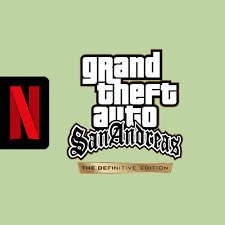



God still has plan for my life and yours no matter what circumstances you may be living in I'm blessed . Governor Kathy Hochul called in the National Guard to get the people in the public off of me , NYPD , MTA workers , NYCD New York City Correction Department, Parole and Probation to get off of me I got no case with them I went legit it's been people in the streets with police and white people trying to drive me crazy the whole New York City using voodoo and I brought Joel Osteen and Joyce Meyer to this city to civilized the people read all their books on any issue you got like Anxiety which causes 99 percent of crimes daily , worrying , depression and not having hope is the major cause of stress , helplessness , hopelessness because the system in place the way the world is but if you read their books it will change your life and I know for a fact musicians in Hip Hop was using voodoo and working with police using voodoo and police against me thank goodness for my people my blood giving me that second stage I wonder does that help them sell records keeping their foot on my neck and or are they jealous because black royalty got me now the black royal family is with me now and better them no then people hate and they work with police and try to unite against me start a new world order against the man helping his community I just legalized weed in like 9 more states come to New York we got weed stores like it's Amsterdam I did that for you please take the voodoo off of me so I could go live my life and enjoy my life in peace ✌️ and quiet . God wins that battle Christianity is based on forgiveness to a Muslim it's all the same true it's the same difference Islam and Christianity I'm a king so I'm familiar with all of it really and realistically I'm 5 Percenter of Nation of Gods and Earths and no I don't mess with other members no more I don't trust nobody in it I let the elders and the brothers in the suits Nuri Muhammad and Farrakhan teach and help them and Islam and Christianity is my only weapon though it's my only gun Gods word and it should be yours your only gun instead of killing your people or neighbor Gods word can be your weapon your knife your automatic weapon it should be gods grace and love for your life in love and compassion for yourself and other human beings we not perfect but God is perfect learn how to deal with situations like that coping skills I love God's word about me and life and my pastors and ministers do come first in my life now but I'm a musician and a businessman and I have a getting money background from the streets but I moved on from the part of my life in the streets and became bigger than I was and I'm grateful and content with being me I love me and what I'm about and this page and my list of accomplishments and my city is a reflection of me I'm everywhere and I help because I know my people needed the help and I was happy to help like I'm that legalized weed that is amazing to me it hits me that I did that I'm the guy that legalized weed I got everything back they gave me my life back I just gotta do my due diligence and get myself together we aight I moved on from the street culture I mainly just help out here to make it better for a people that been treated badly for generations of them I hope the best for them but I'm by myself now and I stay to myself and no to the media and any attachments to me get your life together and move on from me I said no to you attaching yourselves to me no thank you . Look we civilized the famous jail , Rikers Island with my computer programs on Rikers we gave the inmates tablets and video games in jail in New York City and legalized weed and gave them their freedom from old drug cases before my law passed on March 31st , 2021 we reached back and gave them their freedom and civilized them with computers now try Joyce Meyer and Joel Osteen they will civilize New York City I read their books all the time even with a busy schedule on the issues I'm dealing with at that time and so should you now it works for me .
2 notes
·
View notes
Text

"Need Satisfactory Conditions to Grow," Kingston Whig-Standard. May 15, 1933. Page 9.
----
Mental Disorders Constitute One of the Great Social Problems
----
MONTREAL - Prevention of mental disorder and. delinquent and criminal behavior lies not in finding a new drug or growth but in providing satisfactory conditions for healthy mental growth and development -in recognizing and dealing with significant behavior deviations as they occur in the development period, and in the recognition and correct approach to adult individuals who are showing slight or serious personality or mental disturbances That this is a fundamental society problem was emphasized by Dr. W. T. B. Mitchell, director of the Mental Hygiene Institute, Inc., at the annual meeting here.
"Probably there is today no social problem which rivals it for seriousness and importance. Any organized medical or social work effort which is failing to provide satisfactory leadership or guidance in the sphere of mental health is seriously inadequate" Dr. Mitchell said.
"Some degree of mental health is one of the most frequent causes of individual social failure.
"Attempts to rehabilitate such individual social failures, except through an intelligent plan for treating the underlying conditions, are bound to be costly. wasteful and disappointing" he said.
Nearly 900 cases were treated at the Montreal Mental Hygiene. Institute during past year. These included a wide scope of various new types such as suspected mental disease, mental depression, attempted, suicide. nervousness and fears, seclusiveness, sensitiveness. peculiar behavior, epilepsy and fainting spells, physical complaints enuresia, speech defect. suspected mental defect, school failure. unmarried mothers, social failure and martial maladjustment; stealing, temper tantrums, sex problems, truancy. disobedient, uncontrollable. mental health study, vocational guidance, and psychotic parents.
#montreal#mental hygiene#mental health#history of mental illness in canada#history of mental health#construction of mental illness#madness#eugenics in canada#great depression in canada#mental disease
4 notes
·
View notes
Text
Psychopathology, Ch 2 pt. 3
Identify the major types of helping professionals and describe their training backgrounds and professional roles.
Clinical psychologists: have earned a doctoral degree in psychology, either a PhD (Doctorate of Philosophy), a PsyD (Doctorate of Psychology), or an EdD (Doctorate of Education) from an accredited college or university. Training in clinical psychology typically involves four years of graduate coursework, followed by a year-long internship and completion of a doctoral dissertation. Clinical psychologists specialize in administering psychological tests, diagnosing psychological disorders, and practicing psychotherapy. Until recently, they were not permitted to prescribe psychiatric drugs. However, as of this writing, five states (Idaho, Illinois, Iowa, Louisiana, and New Mexico) have enacted laws granting prescription privileges to psychologists who complete specialized training programs. The granting of prescription privileges to psychologists remains a hotly contested issue between psychologists and psychiatrists and within the field of psychology itself.
Counseling psychologists: also hold doctoral degrees in psychology and have completed graduate training preparing them for careers in college counseling centers and mental health facilities. They typically provide counseling to people with psychological problems falling in a milder range of severity than those treated by clinical psychologists, such as difficulties adjusting to college or uncertainties regarding career choices.
Psychoanalysts: typically are either psychiatrists or psychologists who have completed extensive additional training in psychoanalysis. They are required to undergo psychoanalysis themselves as part of their training.
Psychiatrists: have earned a medical degree (MD) and completed a residency program in psychiatry. Psychiatrists are physicians who specialize in the diagnosis and treatment of psychological disorders. As licensed physicians, they can prescribe psychiatric drugs and may employ other medical interventions, such as electroconvulsive therapy (ECT). Many also practice psychotherapy based on training they receive during their residency programs or in specialized training institutes.
Psychiatric nurses: typically are registered nurses (RNs) who have completed a master’s program in psychiatric nursing. They may work in psychiatric facilities or in group medical practices where they treat people suffering from severe psychological disorders.
Clinical or psychiatric social workers: have earned a master’s degree in social work (MSW) and use their knowledge of community agencies and organizations to help people with severe mental disorders receive the services they need. For example, they may help people with schizophrenia make a more successful adjustment to the community once they leave the hospital. Many clinical social workers practice psychotherapy or specific forms of therapy, such as marital or family therapy.
Counselors: have earned a master’s degree by completing a graduate program in a counseling field, such as mental health counseling or rehabilitation counseling. Counselors work in many settings, including private practices, schools, college testing and counseling centers, and hospitals and health clinics. Many specialize in vocational evaluation, marital or family therapy, rehabilitation counseling, or substance abuse counseling. Counselors may focus on providing psychological assistance to people with milder forms of disturbed behavior or those struggling with a chronic or debilitating illness or recovering from a traumatic experience. Some are clergy members who are trained in pastoral counseling programs to help parishioners cope with personal problems.
Describe the goals and techniques of the following forms of psychotherapy: psychodynamic therapy, behavior therapy, person-centered therapy, cognitive therapy, cognitive-behavioral therapy, eclectic therapy, group therapy, family therapy, and couples therapy.
Psychotherapy: a structured form of treatment derived from a psychological framework that consists of one or more verbal interactions or treatment sessions between a client and a therapist.
- used to treat psychological disorders, help clients change maladaptive behaviors or solve life’s problems, or to help them develop their unique potentials.
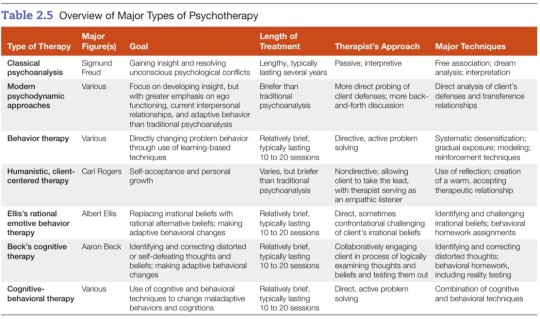
Psychoanalysis: the method of psychotherapy developed by Sigmund Freud.
Psychodynamic therapy: therapy that helps individuals gain insight into and resolve deep-seated conflicts in the unconscious mind.
Free association: the method of verbalizing thoughts as they occur without a conscious attempt to edit or censor them.
Transference relationship: in psychoanalysis, the client’s transfer or generalization to the analyst of feelings and attitudes the client holds toward important figures in their life.
Countertransference: in psychoanalysis, the transfer of the analyst’s feelings or attitudes toward other persons in their life onto the client.
Behavior therapy: the therapeutic application of learning-based techniques to resolve psychological disorders.
Systematic desensitization: a behavior therapy technique for overcoming phobias by means of exposure to progressively more fearful stimuli (in imagination or by viewing slides) while remaining deeply relaxed.
Gradual exposure: in behavior therapy, a method of overcoming fears through a stepwise process of exposure to increasingly fearful stimuli in imagination or in real-life situations.
Token economy: a behavioral treatment program that creates a controlled environment in which desirable behaviors are reinforced by dispensing tokens that may be exchanged for desired rewards.
Person-centered therapy: the establishment of a warm, accepting therapeutic relationship that frees clients to engage in self-exploration and achieve self-acceptance.
Empathy: the ability to understand someone’s experiences and feelings from that person’s point of view.
Genuineness: the ability to recognize and express one’s true feelings.
Congruence: the coherence or fit among one’s thoughts, behaviors, and feelings.
Cognitive therapy: a form of therapy that helps clients identify and correct faulty cognitions (thoughts, beliefs, and attitudes) believed to underlie their emotional problems and maladaptive behavior.
Rational emotive behavior therapy (REBT): a therapeutic approach that focuses on helping clients replace irrational, maladaptive beliefs with alternative, more adaptive beliefs.
Cognitive behavioral therapy (CBT): a form of psychotherapy incorporating cognitive and behavioral techniques.
Eclectic therapy: an approach to psychotherapy that incorporates principles or techniques from various systems or theories.

Group therapy: a form of therapy in which a group of clients with similar problems meets together with a therapist.
Family therapy: a form of therapy in which the family, not the individual, is the unit of treatment.
Couples therapy: a form of therapy that focuses on resolving conflicts in distressed couples.
Evaluate the effectiveness of psychotherapy and the role of non-specific factors in therapy.
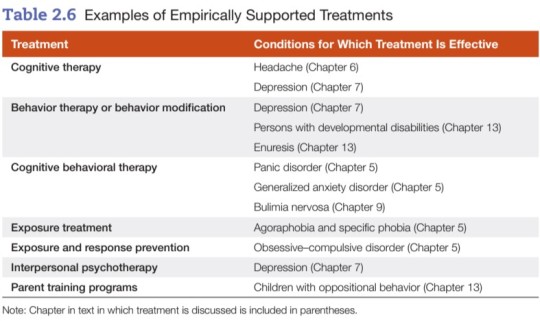
Nonspecific treatment factors: factors not specific to any one form of psychotherapy, including
empathy, support, and attention shown by the therapist
the therapeutic alliance = attachment the client develops toward the therapist and the therapy process
the working alliance = effective working relationship in which the therapist and client work together identifying and confronting the important problems and concerns the client faces
Telehealth: delivery or facilitation of treatment services via telecommunication or digital technology.
Evaluate the role of multicultural factors in psychotherapy and barriers to use of mental health services by ethnic minorities.
- Cultural sensitivity involves more than good intentions. Therapists must have accurate knowledge of cultural factors and the ability to apply that knowledge when developing culturally sensitive approaches to treatment.
- Just because a given therapy works with one population group does not mean that it will necessarily work with other groups. Therapists using established treatments should consider how they can incorporate culturally specific elements to boost treatment benefits in working with people from different ethnic or racial groups.
- Some of the barriers to mental health services for marginalized communities include...
Cultural mistrust: People from minority groups often fail to use mental health services because they don’t trust mental health institutions/professionals. Mistrust may stem from a cultural and/or personal history of oppression and discrimination, or experiences in which service providers were unresponsive to their needs. When minority clients perceive white therapists and white-dominated institutions to be cold or impersonal, they are less likely to place their trust in them.
Mental health literacy: A person may not make use of mental health services because they lack knowledge of mental disorders and how to treat them.
Institutional barriers: Facilities may be inaccessible to marginalized people because they are located at a considerable distance from their homes or because public transportation is lacking. Marginalized people are often overwhelmed or intimidated by bureaucratic red tape and/or protocol around health procedures.
Cultural barriers: Many recent immigrants have had little or no previous contact with mental health professionals. They may hold different conceptions of mental health problems or view mental health problems as less severe than physical problems. In some cultures, the family is expected to take care of members who have psychological problems and may resist outside assistance. Other cultural barriers include cultural differences between socio-economically disadvantaged clients and majority white + middle-class mental health staff, and the stigma often associated with seeking mental health treatment.
Language barriers: Mental health facilities may lack the resources to hire mental health professionals who are fluent in the languages of the communities they serve.
Economic and accessibility barriers: Financial burdens are often a major barrier to use of mental health services. Living in a rural or isolated area where mental health services may be lacking or inaccessible is also a big hurdle.
Psychopharmacology: the field of study that examines the effects of therapeutic or psychiatric drugs.
Identify the major categories of psychotropic or psychiatric drugs and examples of drugs in each type and evaluate their strengths and weaknesses.
Anti-anxiety drugs: drugs that combat anxiety and reduce states of muscle tension.
~ also called anxiolytics
~ examples include benzodiazepines (Valium, Xanax) as well as hypnotic sedatives (Halcion)
+ can be safe and effective in treating anxiety and insomnia
- potential for psychological and/or physical dependence, so they tend to be better for short term or occasional relief, not long term or daily use
Rebound anxiety: the experiencing of strong anxiety following withdrawal from a tranquilizer.
Antipsychotic drugs: drugs used to treat schizophrenia or other psychotic disorders.
~ also called neuroleptics
~ examples include Thorazine, Mellaril, Prolixin, Clozapil (atypical)
+ drastically reduced the need for long-term hospitalization, physical restraints, and confinement
- unpleasant side effects, such as muscular rigidity and tremors; long-term use of antipsychotic drugs (with exception of Clozapine) can produce tardive dyskinesia, a potentially irreversible and disabling motor disorder
Antidepressants: drugs used to treat depression that affect the availability of neurotransmitters in the brain.
~ four major classes: tricyclic antidepressants (TCAs), monoamine oxidase inhibitors (MAOIs), selective serotonin-reuptake inhibitors (SSRIs), and serotonin-norephinephrine reuptake inhibitors (SNRIs)
~ examples include Tofranil, Elavil, Sinequan (tricyclics), Nardil (MAOI), Prozac, Zoloft (SSRI), Effexor (SNRI)
+ antidepressants provide beneficial effects for a wide variety of psychological disorders
- however, there are side effects for each category, and in the case of MAOIs, a patient’s diet is heavily restricted

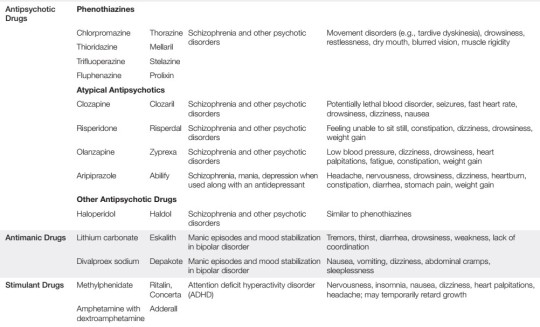
Electroconvulsive therapy (ECT): a method of treating severe depression by administering electrical shocks to the brain.
+ significant improvement for patients experiencing severe epileptic seizures or major clinical depression that has not responded to other treatment
- high relapse rates and memory loss for events occurring around the time of treatment; for these reasons, ECT is a last resort
Describe the use of psychosurgery and evaluate its effectiveness.
~ Previously, the prefrontal lobotomy was the most common form of psychosurgery. This procedure involved surgically severing nerve pathways linking the thalamus to the prefrontal lobes of the brain.
~ The premise of this operation was the belief that severing the connections between the thalamus and the frontal lobe of the cerebral cortex would control a patient’s violent or aggressive tendencies.
- This procedure was abandoned because (1) there was insufficient evidence of its effectiveness and (2) it often produced serious complications or even death.
- When anti-psychotic drugs became available during the 1950s, psychosurgery was all but eliminated.
+ In recent years, more sophisticated psychosurgery techniques have been introduced which target much smaller parts of the brain and produce far less damage than the prefrontal lobotomy. These techniques have been used to treat patients with severe OCD, bipolar, and/or major clinical depression who have failed to respond to other treatments.
~ Another experimental technique is deep brain stimulation (DBS), a surgical procedure in which electrodes are implanted in the brain and used to electrically stimulate deeper brain structures.
+ DBS shows promise in treating severe forms of depression and OCD that have failed to respond to more conservative treatments.
- However, DBS may have serious complications and its effectiveness needs to be investigated further. Thus, it is still an experimental treatment.
Evaluate biomedical treatment approaches.
~ Overall, a combination of medication and talk therapy seems to be more helpful for most mental health patients than either treatment alone.
~ The benefits and risks/side effects of each medication need to be carefully considered and discussed by the provider and the patient.
11 notes
·
View notes
Text
"I Am Sam" is a movie that explores the challenges faced by people with mental illness, The movie tells the story of Sam, a man with an intellectual disability a mental illness that involves problems with general mental abilities that affect Intellectual functioning which includes learning, problem solving, judgement and Adaptive functioning that includes activities of daily life such as communication and independent living (American Psychiatrist Associations 2023). This blog entry will reflect on this movie, reviewing the events from the perspective of an OT.
Sam functions at the age of a 7 year old and manages to raise his daughter Lucy to the age of 7 , when she turns 8 and her intellectual ability grows to be higher than his ,He is shown in this film as struggling to be a good father to his daughter, Sam faces many barriers to performing his role as a father due to his mental illness. His problems increase when social services get involved and he wants to take Lucy away from Sam to foster care as they believe he does not have the capacity to take care of his daughter Lucy. This leads to Sam fighting for her daughter in the court of law with the help of a lawyer, Rita.
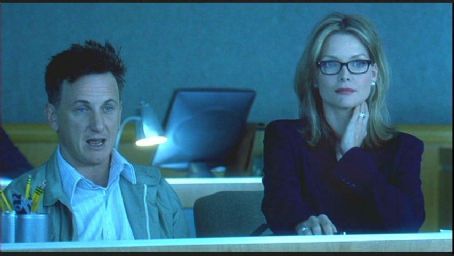
Sam was presented to be struggling to engage in some occupations as well such as his occupation as an employee, he had difficulty with tasks such as organizing the shelves, operating the cash register, and interacting with customers and co-workers. He also had difficulty participating in community activities, such as going to the library or attending events. These challenges are due to his difficulty with executive functioning, social interaction, and emotional regulation, all of which are impacted by his mental illness. These difficulties are some of the reasons why it was presented in court that he does not have the ability to take care of 8-year-old and therefore lost custody of his daughter. These difficulties deprived him of his meaningful role, that of a father.
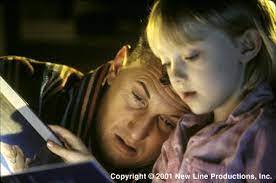
Not only does this movie reveal occupational an engagement difficulties of people living with mental ill but also reveal of how mental illness is often overlooked and under-resourced in the healthcare system. For example, Sam's mental health issues are not taken seriously by his social worker, who sees his difficulties as merely a result of his low IQ. Furthermore, Sam is not given access to the same resources and support that other people with disabilities receive, such as vocational rehabilitation or support groups that could have helped him to be better resourced and equipped to take care of his daughter.
The movie highlights the stigma and discrimination that people with mental illness often face, both from the healthcare system and society at large, according to an article by health direct , stigma can cause people with mental illness to withdraw from society, after having denied custody of her daughter Sam withdraws from society and locks him self in his room, in a corner closed with paper origami, he could not deal with the emotions of dealing with the society that took his daughter away and believed to have no value in it.
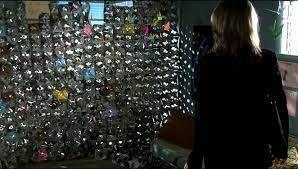
Occupational therapists could have intervened in several ways in this movie, First, they could have provided Sam with more support in the workplace, such as coaching and training on how to perform his tasks. This would have helped him be more successful at work and reduced the likelihood of termination. Second, occupational therapists could have helped Sam develop coping skills and strategies to manage his emotions, as well as strategies for navigating social situations. This would have helped him better interact with his co-workers and customers and reduced the likelihood of conflict or misunderstanding and thus helped him to keep custody of his daughter as a report from the Occupational therapist stating his capability and training would have saved his role as a father.
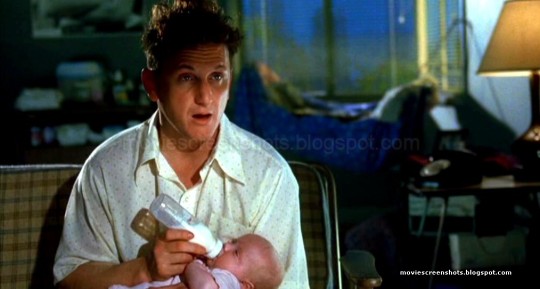
Also, we see the law is portrayed as a barrier rather than a tool for supporting individuals with mental illness. Sam's case in court highlights how the law can be used to discriminate against people with mental illness, rather than protect their rights. Sam is denied custody of his daughter not because he is unable to care for her, but because of the stigma associated with his mental illness. This illustrates how the law can perpetuate stigma and discrimination, rather than promote inclusion and equality. The judge, who made decisions based on stereotypes and preconceived notions about people with mental illness, rather than on the evidence presented in court.
The movie "I Am Sam" offers several valuable lessons for occupational therapy supervisors. First, it shows the importance of taking everyone's situation into account and not making assumptions based on stereotypes or preconceived notions. Sam was not a typical client, and he required a unique approach that took into account his specific needs and abilities. Second, the movie demonstrates the power of collaboration and teamwork in achieving positive outcomes, that was demonstrated through some characters that supported him. Sam's friends and co-workers offered him support and encouragement, both at work and in his personal life. Sam's lawyer, who advocated for him in court and helped him present evidence of his capacity to parent his daughter. Lucy, Sam's daughter, who remained close to him and benefited from his love and care, despite the challenges of his mental illness. These characters helped Sam to engage in his roles as a friend, co-worker, and father, despite the barriers he faced. They demonstrated that support and understanding can make a big difference in the lives of people with mental illness.
Finally, the movie emphasizes the value of compassion and understanding in helping clients to reach their goals, The importance of occupational therapy in helping people with mental illness overcome barriers to occupational engagement and fulfill their meaningful roles.
References
Mahoney, W.J. et al. (2015) Occupational engagement and adults with intellectual disabilities, American Occupational Therapy Association. Available at: https://research.aota.org/ajot/article/70/1/7001350030p1/6123/Occupational-Engagement-and-Adults-With (Accessed: 30 September 2023).
3 notes
·
View notes
Text
Reforming the Criminal Justice System for Equality and Rehabilitation
I chose to advocate for this petition because I want to build a fairer society. By addressing systemic inequalities, emphasizing rehabilitation over punishment, and implementing restorative justice practices, we can create a system that treats all individuals equitably and provides opportunities for rehabilitation and reintegration. It is through these transformative changes that we can strive toward a society where justice is truly served and all individuals have the chance to lead meaningful and productive lives.
The criminal justice system is an essential pillar of any society, designed to maintain law and order while ensuring justice and rehabilitation. However, it has long been plagued by systemic inequalities and a focus on punitive measures rather than addressing the root causes of crime. This explores why I have chosen to advocate for the reform of the criminal justice system, with a particular emphasis on promoting equality and rehabilitation as key tenets for a fairer society.
Reforming the criminal justice system is crucial to addressing the longstanding disparities that disproportionately affect marginalized communities. The current system exhibits biases that result in racial and socioeconomic disparities in arrests, convictions, and sentencing. By prioritizing equality, we can aim to eliminate these discrepancies and ensure fair treatment for all individuals, regardless of their background. Implementing unbiased policing practices, promoting diverse representation in the justice system, and training law enforcement and legal professionals in cultural sensitivity are vital steps toward achieving equality within the system.
A key objective of criminal justice reform is shifting the focus from punishment to rehabilitation. The current system often neglects the underlying causes of criminal behavior, perpetuating a cycle of reoffending. By embracing a rehabilitative approach, we can address the root causes of crime, such as poverty, addiction, mental health issues, and a lack of education or job opportunities. Providing access to quality education, vocational training, mental health support, and substance abuse treatment within correctional facilities can equip individuals with the skills and tools they need to reintegrate successfully into society. Emphasizing rehabilitation not only reduces recidivism rates but also fosters a sense of empathy and compassion within the justice system.
Another vital aspect of criminal justice reform is the implementation of restorative justice practices. Instead of solely focusing on punishment, restorative justice seeks to repair the harm caused by crime by involving all affected parties. It encourages dialogue, understanding, and accountability, providing victims with a voice and empowering offenders to take responsibility for their actions. This approach promotes healing, reconciliation, and the restoration of relationships, ultimately leading to a more harmonious and inclusive society.
In conclusion, reforming the criminal justice system may improve the structure of society. By addressing inequality, prioritizing rehabilitation, engaging the community, promoting evidence-based policies, and humanizing the system, we can work towards a more equitable and effective criminal justice system. Through collective action and advocacy, we have the power to bring about meaningful change and build a society that truly values justice and rehabilitation for all.
2 notes
·
View notes
Text
Hh... can't sleep. Anxiety is being dumb. But also existential shit, and I kinda need to put it somewhere.
Many worst-case scenarios have run through my head. Losing family members being among the worse ones, etc... but of all things, I wonder if I could face speaking with old friends I use to talk to back in HS... my choir directors included.
They were both kind and helped push me toward music, a life-long passion of mine, and one that still burns bright. They gave me opportunities to develop my musical talents and I'm forever grateful for everything they did... but they don't know a lot of what has happened since I left HS. They don't know about my Ehler's Danlos Syndrome, and the various issues that it entails. They don't know that I'm in constant pain, and will be for the rest of my life... they don't know the extent of my anxiety, and how it has prevented me from seeking better jobs out there, or trying to push toward performance. ... and now that I'm trying to push toward being a music teacher myself, even with the help of a vocational rehabilitation program, I still find it very difficult to take the small steps toward sending in applications...
Would they understand that I fell short of my aspirations? Would they be disappointed? Would they feel like the effort they put in was wasted on me? I genuinely don't know, but I also understand that I'm thinking the worst of the what-ifs. I genuinely feel like a failure, like I'm floundering in whatever life wants to throw at me and my family next.
I'm the 2nd child, the eldest daughter, in a family of 7 kids and 2 parents. All of us have health problems in some way or another: my mother's EDS is worse than mine is, among a myriad of health issues, and she already owns a wheelchair she uses. My older brother has an autoimmune disease where he needs to be on medication for the rest of his life, and suffers from rheumatoid arthritis. My 1st younger brother was hit on his motorcycle back in 2020, royally fucking up his knee to the point he needed cadaver tendons; he is still dealing with the aftermath and all that entails physically, emotionally, mentally, and financially. My sisters have varying degrees of physical health problems and mental illnesses: depression, anxiety, one hit puberty too early, another needed surgery to fix her bowed legs, and all us sisters and my mother have Gastroparesis. My 2nd younger brother suffered with anxiety for so long that he went catatonic at one point and needs to be on medication for it, ontop of dealing with scoliosis developing that we need to keep an eye on. My father is among the luckier ones in this merry group of ours, but he's still been beat up in his own way. He's broken so many bones in his body and spine, that a medical professional was surprised he is still walking and working... not to mention having a heart issue as the cherry on top.
I want nothing more than to take care of my family... I want to take care of the people around me that I care about most. I don't want myself or them to have to want for anything, or cry in the middle of the night wondering how to pay for medication or procedures that will help improve their quality of life or just keep them alive. ... but I feel helpless. I can barely scrape by with the little I can do myself, and late at night like this, I want to give up. ... But I can't do that. I shouldn't do that. I have to keep pushing and going because there has to be better days ahead. There has to be days where the pain is more bearable, where the anxiety doesn't have a chokehold on my ability to move forward, where I can help my family and friends through their hardest times like they've helped me through mine.
... and yet, with all this being said, the thing that I'm most scared of in this moment in time, is confessing everything to people I know IRL? It's funny... you're crawling through the fire and the flames only to be scared by a little jumping spider in the grand scheme of things. It doesn't make sense, but y'know... anxiety doesn't make sense sometimes; or, most of the time. I've cracked jokes during traumatic experiences and kept a calm and level head, but then turn around to have a mental crisis over how the people I know/knew IRL would respond in light of... all of the everything. Maybe it's an easier thing to fret over, instead of everything else? I don't know.
I know the steps I want to take from here to keep moving forward. ... I'm scared, I have doubts and insecurities, at times I feel stuck or frozen... And goddammit I gotta figure out how to put away how much I care about what folks think.
But for now I'm still here, and I'm content with that. I don't plan on going anywhere, and I count that as a win.
3 notes
·
View notes
Text
Intensive Outpatient Program in Florida by Destination Hope
Destination Hope’s Intensive Outpatient Program set the standard for substance abuse IOP in Florida and nationwide. The Intensive Outpatient Program level of care is similar to Partial Hospitalization and often follows it in a typical clients stay with us. The primary difference is the number of hours spent in treatment. At the IOP level, clients may attend therapy and counseling 4 days a week and typically in half day sessions.
Essentially, the Intensive Outpatient Program allows them to continue to benefit from the program structure, rehabilitation education, individual assessments, and ongoing support. But it also allows them to step one foot back out into the world. This type of treatment offers intermediate support and is typically viewed as a transitional step to help people bridge the gap between full-time residential treatment and their return to independent living. Many clients choose outpatient care because it allows them to continue living their regular lives. If you believe you have an exceptional degree of commitment to your sobriety and a strong support system at home, you can be successful in an outpatient care program. One often-overlooked benefit of outpatient care is that you get to put the coping strategies you learn into action right way. This can help reinforce your new set of skills and incorporate them into your life.
The DH IOP Program
Our Intensive Outpatient Program at Destination Hope has been created to provide clients continued treatment at a lower levels of care while receiving individualized treatment plans, goals and objectives, with their assigned primary therapist upon admission. Clients are expected to attend a minimum of 9 hours per week consisting of individual, group and family sessions.
Our program schedule offers both daytime and evening hours to accommodate those in early recovery that are or will begin working. Our hours are as follows: Monday-Thursday 11:0AM-2:00PM or Monday-Thursday 5:00PM-8:00PM. All clients admitted into our IOP program will have availability to follow-up with a psychiatrist once weekly for medication management and any mental health concerns that may arise while in our program.
Services provided at the IOP level of care include: individual therapy, group therapy, continued nutritional management, wellness services (including yoga, meditation, Qigong), aftercare planning, case management, vocational rehabilitation services, access to alumni events and continued support via weekly alumni meetings. All clients within our IOP program will be screened weekly via urinalysis to maintain abstinence from any mind/mood altering substances. All clinicians in our IOP program are Masters level and/or licensed in the field of mental health counseling.
How Do I Know If I Need Outpatient Drug Treatment?
When applying for admission to a drug treatment program, individuals are carefully assessed to determine precisely what kind of care they will need. The severity and duration of the substance abuse, as well as the type of substance, will be major factors in this decision. Other factors like job, family, and proximity to the facility are taken into consideration, in order to minimize stressors. The admissions staff will determine the appropriate duration, what kind of treatment will be offered, and the frequency of visits. A typical program might last for six weeks, with the individual attending sessions five nights a week.
Reasons to Return to Outpatient Drug Treatment There are a number of reasons why you may decide to return to outpatient drug treatment. You are going through a particularly stressful time (such as family troubles or a very stressful holiday season) and you find that your recovery is not as stable as it used to be You have used a substance – even a sip of alcohol You find yourself feeling overwhelmed by the temptation of triggers You have begun to experience the strong emotions that contributed to your substance use before you went to treatment Whatever the reason, it is important that you return to treatment if your recovery is in need of reinforcement.
Does Outpatient Drug Treatment Work?
There are a few myths that have led some people to believe that outpatient drug treatment is not effective. Outpatient treatment is right for everyone. Not true! Part of the success of outpatient treatment involves the appropriate placement during admission. Some people are more suited to inpatient treatment and an admissions specialist should be able to help. Clients are faced with too many temptations during treatment. True, some temptations remain, but so is the desire to recover. The relationships formed in the outpatient drug treatment program are not as strong as with the inpatient drug treatment program. This is not necessarily true. Outpatients will participate in group therapy sessions, support groups and more – they will have the opportunity to develop meaningful relationships. The bottom line? Outpatient drug treatment can work if it’s the appropriate treatment level.
Visit the Destination Hope website to know more about the Intensive Outpatient Program in Florida and nation wide.
2 notes
·
View notes
Text
What can Someone Do with a Master's Degree in Social Work?
Introduction:
People who desire to contribute to raising the standard of living for communities who are at risk and underprivileged are drawn to the social work profession. Dr. Suresh Borole helps to Make a difference in your area of interest more directly is made possible by online social work degree programs' many specializations or areas of improvement.
Between 2016 and 2026, the demand for social workers is expected to increase at a pace of 16%, which is much higher than the average growth rate for all occupations. Professionals are being prepared through advanced online social work degree programs to contribute positively to this dynamic area at the local, state, national, and worldwide levels.
Master of Social Work, Scope In India:
Social work is one of the top 10 development sectors with the quickest growth rates in the current economic environment. Social workers, who work in this sector, actively encourage change at the individual, communal, and policy levels and help individuals produce positive results. Everyone, from a fourth-grader to well-known figures like Dia Mirza or well-known brands like Times of India, is supportive and eager to provide humanitarian service to our nation.
This skill is essential in today's society since, without it, we risk neglecting the less fortunate people in our zeal to grow personally and professionally. A postgraduate program called the Master of Social Work, MSW provides students with a combination of theoretical knowledge and practical experience in the development of underserved communities. An ideal MSW program structure would involve students working with these communities while being guided by professionals, receiving classroom instruction, and engaging in real-time contact.
MSW: Jobs and Career Opportunities
A Master of Social Service degree, sometimes known as an MSW, opens you several opportunities in stimulating and demanding community work environments. The degree gives students the chance to investigate many specializations and pursue careers in fields including healthcare, education, and women's and children's development, to name a few. A Best Social Worker in Jalgaon the initial focus of a graduate's work is on issues such as women's empowerment, mental health support, substance addiction and rehabilitation, refugee rights, family welfare, financial aid for low-income families, and child safety.
Certain certificates may be needed for some of the jobs in these regions. Most social work graduates work for government entities, international NGOs, and for-profit health organizations. A social work degree may be the best option for those who find satisfaction in assisting and fostering the growth of members of society's leadership.
After Acquiring a Master of Social Work, Many People Choose the Following Careers:
Administration and Management
Advocacy and community organization
Child welfare
Developmental disabilities
Health care
International social work
Justice and correction
School Social Work
Policy Analyst
Corporate Social Responsibility
Human Resources Coordinator/Specialist
Why Does Our Society Need Social Workers?
Anyone having an MSW degree should focus on raising the bar for human life and wellbeing. In this line of work, communities or persons who are oppressed, impoverished, vulnerable, or unheard receive extra attention. Many people think that pursuing this vocation will help to advance justice and social progress.
Benefits of Being a Social Worker:
Social Workers Make a Positive Impact
Empowering Communities
Every Day Is Different
Many Opportunities for Specialization
Flexible Hours
Social Work Is a Growing Field
Increased Job Opportunities
Higher Salaries
Path to Teaching
Diverse Social Work Career Options
You can gain transferable skills
The world needs social workers
You will meet like-minded people
It teaches you the true value of things
Simulation facilities
What Does the Future Hold for Social Workers?
From 2019 to 2029, the employment of social workers is predicted to grow by 13%, creating more than 90,000 new job opportunities. This form of work security is quite rare in professions, which is partly a result of the increasing inequalities in local communities.
Social workers are the human translators of change in a society that is changing quickly. As gaps increase and become more pronounced, the necessity for social workers will increase.
Although the profession's growth overall is encouraging, MSW degree holders have even better job prospects. Real-time labor market data from the previous year show that obtaining a master's degree in social work increased career chances by 33%.
2 notes
·
View notes
Text
Midterm Reflections: SDG guide to make an impact in the community
It's 2015, and the United Nations has just called a universal call to action to end poverty and inequality, protect the planet, and ensure all people enjoy health, justice, and peace.
Who will respond to this call? (WHO)
WELCOME BACK TO BLOG 3, WEEK 3
Can you believe it's already midterms? That means we're halfway through the block, and by now, I have begun to understand the multi-dimensional layer it takes to be a community OT. As I grow fonder of the community, I keep asking myself how can I make a significant impact with the little time I have left. The task sometimes seems almost impossible and overwhelming, as there’s so much to do and so much more that can be done… This blog will highlight the work I intend to do in the community using the Sustainable Developmental Goals (SDG) as a guide.
Before I begin, let me briefly inform you about the SDG- In 2015, the United Nations came together to create a plan for a better future called the Sustainable Development Goals (SDGs). It comprises of 17 goals to make the world fairer, safer, and more prosperous by 2030 (UN). The SDGs build on the progress made by the Millennium Development Goals (MDGs), launched in 2000. The MDGs made a big difference in reducing poverty, improving healthcare, and promoting education globally, with the exception of developing sub-Saharan Africa, leaving millions of people still lagging behind. This is why an urgent global call to action was required…

The SDGs are a call upon governments, businesses, and individuals to work together to ensure quality education and healthcare and promote peace and justice, among many other goals, as explained in the link below:
This one is related to South Africa and is more relevant to us.

So, what are we, as community OTs, doing to work towards these goals?
In my last blog, I mentioned how my mornings occur at the New Clinic where we do health promotion. Here, we inform the patients about OT, screen for possible clients, and educate and rehabilitate those in need. We see a variety of cases from psychological, physical, and pediatrics, such as mums with postpartum depression, workers with low back pain, elderly people with arthritis, and kids with developmental delays. This aligns with SDG 3, “Good Health and Wellbeing’’, in which we aim to promote physical and mental health and well-being for all ages. This goal concerns maternal and child health; you can read more about that in my first blog! We also run an active aging group for elderly ladies to promote healthy aging, prevent age-related diseases, and encourage social participation.
The next goal we intend to work towards is SDG 4: “Quality Education.” This goal aims to ensure all learners have access to ECD centers such as creches (4.2) to prepare them for primary school. In Kenville, there are many creches, but the kids are often under-stimulated and do nothing all day. As OTs at the creches, our role is to stimulate and bridge that gap to prepare the kids for primary school. We do this by using play, building cost-effective and stimulating toys, and upskilling teachers to support the learners better. The goal also aims to improve youth literacy and numeracy skills (4,6). At the Kenville primary school, we see many learners unable to read, write, and count. As OTs, we can use alternative and fun learning methods to help learners meet their grade requirements and write legibly.
Moreover, we try to promote SDG8, “Decent Work and Economic Growth.” With our individual clients, we provide vocational rehab for those who are struggling to work due to an illness or injury such as pain, edema, or a hand injury. At the New Clinic, we run a project called KITE, which employs a local community member to work to sell donated clothes to earn an income. We have also been trying to run a job skills program to upskill community members and teach them financial literacy skills. We also aim to tackle youth unemployment by running a study skills group and career guidance for high school learners to educate them about careers and colleges, to improve their marks, and to be able to meet university requirements.
Another goal we intend to work towards is SDG10: “reduced inequalities.” At Kenville, we see income and social inequalities such as poverty, gender-based violence, xenophobia, and the effects of patriarchy on women. This perpetuates a cycle of poverty and marginalization. As OTs, we try to reduce inequalities by focusing on advocacy, education, and social inclusion. At the high school, we discuss pressing issues such as bullying, substance abuse, and teenage pregnancy to help combat these issues. We also run expressive groups for the youth to provide a safe space for the kids and to promote self-esteem and a sense of equality within the community. This links with the last goal as well…
Lastly, we aim to work towards SDG11, “Sustainable Cities and Communities”. This goal aims to make cities and human settlements inclusive, safe, resilient, and sustainable. Kenville has a lot of litter and pollution; we can try to start community clean-up initiatives and environmental education programs; this can be done with the youth soccer kids as they are the ones playing on the fields. We can collaborate with local organizations and businesses to make community resources more sustainable and safer. Our goal for this block is to get a shipping container to work from and improve the youth soccer field (i.e., build goals and clean space). We also need to ensure our programs implemented are sustainable and continue even without us present through caregiver/ teacher/social worker education or, better yet, advocate for an OT post within the community. As OTs, we can also make and provide assistive devices and adapt the home environment to make it more inclusive and safe for people with disabilities.
As you can see, OTs have an active role within communities in helping meet sustainable developmental goals. For the last 3 weeks, we have ''unconsciously'' been working hard, in accordance with the SDG, to help create communal change, promote health, reduce inequalities, provide quality education and work opportunities, and achieve a sustainable and safe community. By focusing on these five SDGs, we aim to create a ripple effect of positive change within our community. It's important to note that each goal has many sub-goals; we, as OTs, work within our capacity to meet these goals as much as possible, despite the various barriers - such as corruption, poor service delivery, discrimination and occupational ennui of clients- yet our impact is still significant. Considering we have 5 years until our goals should be met, there is so much to do, indicating the need for more/permanent OT services at the community level. Seeing the importance of the SDG to promote health, justice, and peace, as well as the link between the SDG and our OT role, I ask you, have you responded to the UN's call as a future or graduate OT?
Until the next blog
Peace ✌️
0 notes
Text
New Secure School in Rochester, Kent Reduces Youth Crime
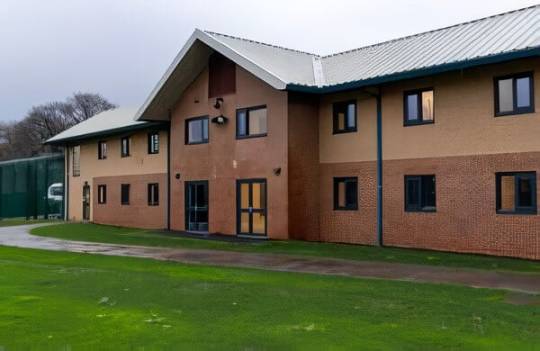
A groundbreaking initiative is set to transform youth justice in the UK. Oasis Restore, the nation's first Secure School, aims to steer serious young offenders away from gangs and knife crime through intensive education and training. This institution, located in Rochester, Kent, poises to open soon, with a mission to reduce reoffending and protect the public.
Addressing Youth Crime with Innovative Solutions
The UK has seen a significant drop in youth custody numbers, with an 82% reduction since 2010. However, the remaining young offenders often have complex needs, including serious mental health issues and poor educational backgrounds. The Oasis Restore Secure School seeks to address these challenges with a holistic approach.
A New Approach to Rehabilitation
Informed by international research and the recommendations of the Chief Inspector of Prisons, Charlie Taylor, the design of the Secure School prioritizes a fresh approach. At the heart of this approach lie smaller settings, high-quality education, and healthcare, all delivered by a specialized workforce. These elements combine to form the bedrock of this innovative model.
Recognizing the potential of this approach, Prisons and Probation Minister Edward Argar recently visited the school to witness how this new approach will help young offenders reintegrate into society as law-abiding citizens.
Education and Training at the Core
Education is at the heart of Oasis Restore's rehabilitation strategy. Every young offender will be enrolled in formal education or vocational training. The curriculum includes core academic subjects such as English and Maths, and students will receive one-to-one support to meet challenging targets. Additionally, vocational workshops will provide qualifications in areas like barbering, design technology, and catering, preparing the youth for secure employment or further study upon release.
Comprehensive Support Systems
The Secure School places a strong emphasis on healthcare and mental health support. Recognizing the complex needs of its students, the institution offers tailored healthcare services to address both physical and mental health issues. This comprehensive support is crucial in steering young offenders away from criminal behavior and towards a more positive future.
Community and Safety
Ensuring the safety and security of both the students and the public is paramount. The Secure School operates with the same rigorous security procedures as other custodial settings. Placement decisions are made following thorough risk assessments by the Youth Custody Service, prioritizing safety at every step.
Endorsements and Expectations
The initiative has garnered significant support from various quarters. Lord Chancellor and Secretary of State for Justice, Alex Chalk, emphasized the government's commitment to youth rehabilitation, stating,
"This multi-million-pound investment marks a major step change in our approach to youth detention. By prioritising intensive education, this Secure School will put the rehabilitation of young offenders front and centre, helping to break the cycle of crime."
Rev Steve Chalke MBE, Founder of Oasis, highlighted the school's revolutionary approach:
"Oasis Restore represents a revolution in youth justice – a revolution that’s built on both science and experience."
"The core principle behind the Secure School and the work of our staff team is an unshakeable commitment to the belief that the only way to create positive change for the young people we serve, as well as to make our streets and communities safer, is to ensure that restoration sits at the very heart of the youth custodial system."
The Path Forward
Oasis Restore Secure School will house up to 49 boys and girls at any given time. Consequently, the focus on high-quality education and vocational training aims to equip these young offenders with the skills needed to lead law-abiding lives.
Ofsted inspectors, supported by the Care Quality Commission, will ensure they maintain the highest standards in education, care, and health to achieve this goal.
As the school prepares to open, the hope is that this innovative approach will significantly reduce reoffending rates and contribute to a safer society. The government's sustained efforts to tackle youth crime, coupled with the Secure School's comprehensive rehabilitation programs, represent a promising future for youth justice in the UK.
Find out more about Oasis Restore School.
Sources: THX News, Ministry of Justice, The Rt Hon Alex Chalk & The Rt Hon Edward Argar MP.
Read the full article
#educationandtraining#gangprevention#knifecrime#Mentalhealthsupport#OasisRestore#rehabilitationprograms#youngoffenderseducation#youthcrimereduction#youthcustody#youthjusticereform
0 notes